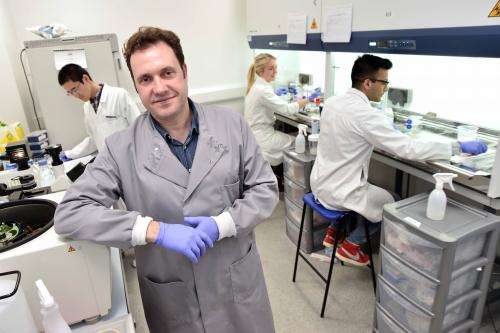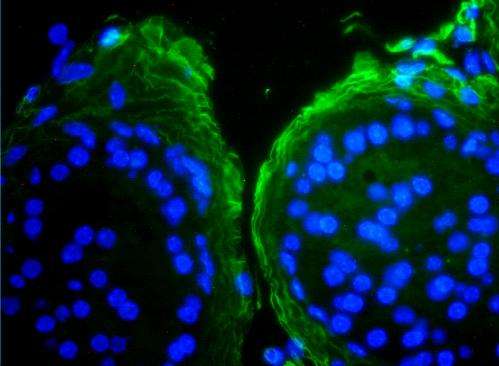'Jekyll and Hyde' molecule is key to new personalised medicine for prostate cancer

Researchers who have uncovered the 'monstrous' hidden nature of a molecule involved in prostate cancer say the findings could herald a new form of personalised medicine for patients, with doctors able to use the same molecular target for diagnosis and treatment.
In a series of two papers just published*, researchers at The University of Hull have shown that prostate cancer patients who have Endo180 protein present in their tumours tend to have more severe disease. Around 65 per cent of men with Endo180 positive tumours died within 5 years of diagnosis, compared to just 39 per cent who did not have Endo180. These results suggest that Endo180 contributes to thousands of prostate cancer deaths. And the team have also uncovered why this might be.
"It's a real Jekyll and Hyde scenario," says lead researcher Dr Justin Sturge. "We found that in healthy 'non-cancerous' prostate cells Endo180 normally sticks to another molecule called CD147. This pairing of two proteins completely suppresses the cells from behaving dangerously. When we broke the two molecules apart, Endo180 completely flipped its role and actively encouraged cells to break away from each other, which is the deadly feature of those cancers that start to spread to other parts of the body."
Further work by the team has added the final mechanistic link from protein to patient, by showing that physical changes in prostate tissue during ageing can trigger this sudden switch in Endo180 activity.
"We've not only shown that Endo180 is a strong predictive marker for survival in patients with prostate cancer, but we've also uncovered a new mechanism involving this same molecule, and a potential new way to monitor and target the disease" says Dr Sturge.
"We believe this research will ultimately help to open the way to personalised medicine for prostate cancer patients. Our findings suggest that if a patient has early disease that is positive for Endo180 we can help limit their disease by stabilizing the protein before it 'turns'. The next stage is development of new treatments that can do this."

Dr Helen Rippon, Head of Research at Worldwide Cancer Research, which helped fund this work said "Personalised medicine is a really exciting area of cancer research right now and Dr Sturge's work shows just why that is - the potential benefits are huge. If we can target the right treatment to the right patient at the right time, then not only can we improve cancer survival, we can also reduce unnecessary treatments and side-effects for those who don't need it."
More information: Domain Interaction of Endo180 and CD147 Survival Outcome and EMT Suppression Mediated by a Lectin Domain Interaction of Endo180 and CD147. M. Rodriguez-Teja, JH. Gronau, A. Minamidate, S. Darby, L. Gaughan, C. Robson, F. Mauri, J. Waxman, and J. Sturge. Mol Cancer Res; 2014;DOI: 10.1158/1541-7786.MCR-14-0344-T
AGE modified basement membrane cooperates with Endo180 to promote epithelial cell invasiveness and decrease prostate cancer survival. M. Rodriguez-Teja, JH. Gronau, C. Breit, Y. Zhi Zhang, A. Minamidate, MP. Caley, A. McCarthy, TR. Cox, JT. Erler, L. Gaughan, S. Darby, C. Robson, F. Mauri, J. Waxman and J. Sturge. Journal of Pathology. DOI: 10.1002/path.4485

















